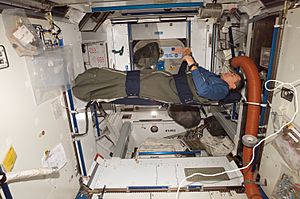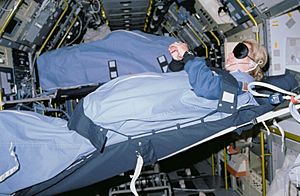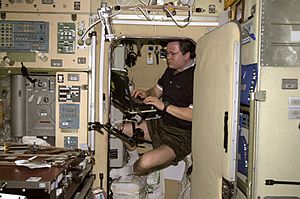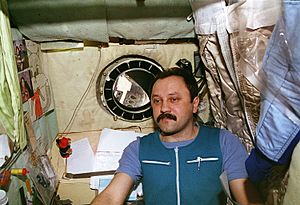Sleep in space facts for kids
Sleeping in space is a big deal for astronauts. It affects their health, how well they can do their jobs, and how they feel. Astronauts often have to work long hours without much rest. Not getting enough sleep can make them very tired, which is called fatigue. This fatigue can cause mistakes, especially when they are doing important jobs. People who are tired might not even realize how much it affects them. Both astronauts and the teams on Earth can get very tired. This happens because they do not get enough sleep or their body clocks get mixed up. Being tired from lack of sleep or too much work can lead to errors. This could put the mission and everyone's safety at risk.
Contents
How Do Astronauts Sleep in Space?
Sleeping in space is different from sleeping on Earth. Astronauts sleep in a small room, often called a crew cabin. It is about the size of a shower stall. They use a sleeping bag that is strapped to the wall. This stops them from floating around while they sleep. Astronauts have said they have dreams and even snore in space.
The sleeping areas need good air flow. In the early 2000s, astronauts on the ISS usually got about six hours of sleep each day.
Why Sleep is Important on Earth and in Space
Not getting enough sleep for a long time can affect how well you do things. Studies show that being awake for 17 hours is like being impaired from alcohol.
Too much work and mixed-up body clocks can make people perform poorly. People who work different shifts often feel more tired. This is because their sleep schedule does not match natural daylight. They are more likely to have accidents. Their work quality and productivity can also go down.
Teams on Earth at NASA also face sleep problems. They often have to change their sleep times. This happens when they support important International Space Station operations during night shifts.
Sleeping in Space: What We Learned
During the Apollo program, scientists learned a lot about sleeping in space. They found that astronauts slept best if:
- Their sleep schedule was not changed much before the flight.
- Everyone in the spacecraft slept at the same time.
- Astronauts could take off their suits before sleeping.
- Work times were planned to give 6-8 hours of quiet rest.
- Loose straps kept astronauts from floating in zero-gravity.
- A hammock or bed was used on the Moon.
- The cabin temperature and sleepwear were comfortable.
- Astronauts could dim lights or block sunlight.
- Noisy equipment was made quieter.
NASA now has rules about how many hours astronauts can work. This is called "Fitness for Duty Standards." Space crews usually work 6.5 hours a day. Their work week should not be more than 48 hours. NASA says working more than 10 hours a day for 3 days, or over 60 hours a week, is too much. Astronauts have said that very busy times can make them feel mentally and physically tired. Studies show that too much work combined with poor sleep can cause health problems and mistakes.
Research shows that astronauts sleep less and not as well in space as they do on Earth. Sometimes they need medicine to help them sleep. This shows that sleep is often disturbed. Space flight data proves that sleep loss, too much work, and mixed-up body clocks affect how well astronauts can do tasks. It also affects their reaction time and memory.
What Makes it Hard to Sleep in Space?
Many things can make it hard for astronauts to sleep well in space. These include:
- Noise
- Feeling uncomfortable physically
- Feeling like they are falling (called voids)
- Other crew members making noise or moving around
- Temperature
Scientists are studying these factors. They want to see how they affect sleep and tiredness. They are also looking at how work schedules, space conditions, and flight rules affect sleep and performance.
What Mixes Up Body Clocks in Space?
Light is the biggest reason why astronauts' body clocks get mixed up on the ISS. The ISS goes around Earth every 1.5 hours. This means the crew sees 16 sunrises and sunsets every day! Changing sleep times quickly also mixes up body clocks in space.
Other things that can mix up body clocks in space are:
- Working different shifts
- Working long hours
- Changes to the daily schedule
- Quickly changing sleep times
- Long periods of daylight on the Moon
- The different length of a day on Mars (Mars sol)
- Unusual light exposure
See also
- Effects of sleep deprivation in space
- Effects of sleep deprivation on cognitive performance
- Shift work sleep disorder
- Skylab 4
- Sleep deprivation
 | Bayard Rustin |
 | Jeannette Carter |
 | Jeremiah A. Brown |





